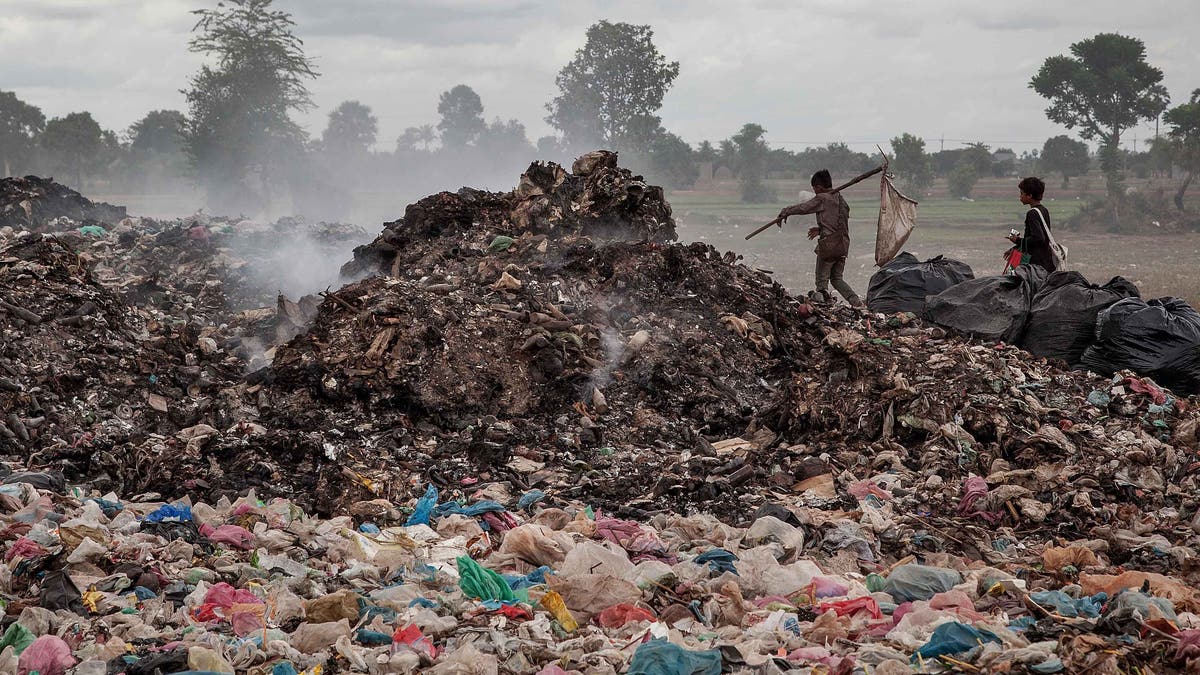
SIEM REAP, CAMBODIA - JUNE 11: A couple of young boys walk between tons of rubbish where they work daily in the Anlong Pi landfill on June 11, 2014 in Siem Reap, Cambodia. Dozens of children work every day in the Anlong Pi landfill, which is situated only few kilometres aways from the world famous Angkor temples, visited by more than 3 million tourists every year. Despite the Cambodian government's commitments and legal responsibilities to end child labor - enshrined in its ratification of relevant international covenants, domestic laws and the implementation of several national policies aimed at ending child labor - it remains a significant concern in Cambodia, where almost a third of the population lives on less than a dollar per day. Child labor is a consequence of this poverty, often resulting from a family's inability to support itself. According to a recent report from the International Labour Organisation (ILO), an estimated 19.1% of the close to 4 million children in Cambodia between the ages of 5 and 17 engage in economic activities. An estimated 56.9% of those children are child labourers, with a third of them being involved in hazardous activities mostly in the agriculture, forestry and fishing sectors. (Photo by Omar Havana/Getty Images) (2014 Getty Images)
As Congress considers legislative solutions to the fiscal crisis in Puerto Rico, there is another that requires action from Washington: the environmental crisis enfolding the island’s landfills. Just like the fiscal crisis ballooned over years in the absence of strong policies, the same has happened on solid waste disposal and Washington has a clear role to play.
The latest development came on March 16, when José Font, head of the Caribbean Environmental Protection Division of the U.S. Environmental Protection Agency (EPA) announced that three landfills had to be closed for being non-compliant with the federal Resource Conservation and Recovery Act (RCRA). This, in addition to three others that were ordered to close last year.
Font warned of “imminent risk to public health.” One of those landfills had just caught fire weeks earlier and the three facing closure are among 22 of the 27 landfills in Puerto Rico that are operating in violation of RCRA.
Although 55 percent of Puerto Rico’s waste stream is considered recyclable, actual recycling is largely limited to urban areas. Curbside pickup programs are very limited, which makes recycling more difficult to implement and monitor.
Before RCRA, Puerto Rico had almost one landfill for each of its 78 municipalities. After the law was passed and standards were raised, most of them were closed for failing to meet those standards and resources were never adequate to help local municipalities deal with solid waste in a sustainable way while also protecting local communities. It is symbolic of the dysfunctional relationship between the federal government and Puerto Rico.
My years as the Executive Director of Puerto Rico’s Solid Waste Authority (SWA) opened my eyes to both the solutions we need and the challenges we face on the island, especially in its relationship with Washington.
The mayors of our 78 municipalities can’t be expected to haul and dump the people’s trash safely and sustainably within a decaying and shrinking waste management infrastructure that never got the kind of attention that states and cities on the mainland have gotten for decades. This is even more urgent in a period of severe economic and fiscal crisis like today in Puerto Rico. The only way to accomplish this is with decisive action from Washington together with Puerto Rico.
Federal funding should be directed toward the establishment or expansion of single stream curbside pickup programs and material recovery facilities (MRFs). Boosting the amount and quality of recycling can help alleviate the current situation.
Puerto Rico generates between 5.16lbs and 5.56lbs of solid waste per person per day, while the mainland United States generates 4.50. But Puerto Rico’s recycling rate is only about 10 percent, while the mainland’s is approximately 35 percent.
Although 55 percent of Puerto Rico’s waste stream is considered recyclable, actual recycling is largely limited to urban areas. Curbside pickup programs are very limited, which makes recycling more difficult to implement and monitor. The funding hasn’t been there, either from the federal government or local authorities, and the results are clear.
There have been political messages about recycling from the EPA to Puerto Rico, but no local government can go from 10 percent to 35 percent without a joint plan with the federal government and the resources to go with it. Funding provided by the federal government will give the municipalities financial room to follow EPA closure orders in partnerships rather than in crisis.
Rep. Rob Bishop (R-UT) will soon propose legislation in Congress that provides an opportunity to turn this situation around. Congress has the authority today to provide the resources we need, through block grants, through EPA and other mechanisms, to help stabilize Puerto Rico’s waste management infrastructure and bring more order to the process of closing non-compliant landfills. Our Resident Commissioner, Pedro Pierluisi, has publicly called for Congress to do its part. Given the terrible lag in Puerto Rico’s recycling rates, much more can be done at relatively little cost in budgetary terms.
The combination of EPA enforcement with support for local efforts to promote and increase recycling, not only among large corporations, but in households, small businesses and average neighborhoods across Puerto Rico, is where the real work must be done to make a long-lasting difference. The task is big, but that only highlights how help from Washington today will mean long-term sustainability in the future for Puerto Rico’s environment.
